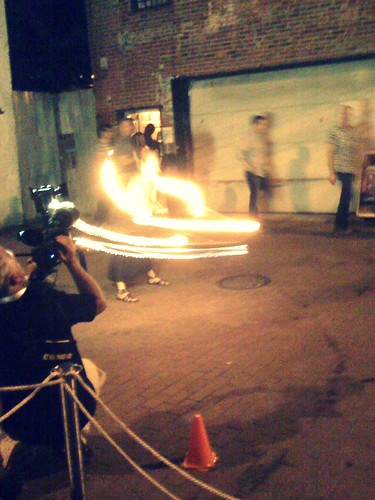I finally had a chance to read the Creative DC Action Agenda. The report, commissioned by DC Office of Planning in partnership with the Washington, DC Economic Partnership, does a really good job at highlighting the role that the creative industries have in making DC a vibrant and fascinating city. There’s some really interesting tidbits contained in the report, such as:
- Creative jobs amount to more than 10 percent of the city’s employment base and generate $5 billion in income.
- There are more than 75,000 creative jobs in the city, including 16,000 federal government positions.
- With 69 theaters producing 8,723 performances in 2008, DC is now among the top tier of theater cities in the U.S.
- DC was ranked fourth in the nation for the concentration of artistic talent, behind Los Angeles, New York, and San Francisco.
- The average wage for creative occupations in DC is $33.73 per hour.
The definition of creative occupations is fairly broad, and includes people in the culinary arts and even libraries. However, DC has a fairly high concentration of writers and visual artists, as well. This creative community adds to the city’s tax coffers and attracts newcomers to Washington.
Washington has come a long way since the municipal dysfunction of the 1990s. But there’s much that the city can do to empower the artistic community in DC, including:
- Identify vacant spaces for theater and work spaces.
- Increase visitor awareness of the creative arts beyond the Mall.
- Improve access to funding for filmmakers.
- Cut the red tape that makes DC unfriendly to small business.
As a member of the “creative occupations” myself, it’s really interesting to see the big picture. What do I think should be done? The last point on cutting red tape really resonates with me. DC should cut regulations that inhibit small businesses and artists in the city. There are so many confusing city rules about running a business from home that I’m not sure what’s legal. And everyone I know who tries to create some sort of festival or event encounters a thicket of regulations and forms, requiring countless trips to city offices. It seems crazy in 2010 that dealing with the city requires filling out reports by hand and collecting stamps and signatures. Eliminating this old-fashioned paperwork (or at least putting it online) would further encourage the ongoing creative renaissance of this city.
DC should capitalize on the creative talent drawn here by reducing the burden of regulation. As demonstrated in the Creative DC Action Agenda, a liberated “artist-entrepreneur” community would deliver economic benefits citywide.
I finally had a chance to read the Creative DC Action Agenda. The report, commissioned by DC Office of Planning in partnership with the Washington, DC Economic Partnership, does a really good job at highlighting the role that the creative industries have in making DC a vibrant and fascinating city. There’s some really interesting tidbits contained in the report, such as:
· Creative jobs amount to more than 10 percent of the city’s employment base and generate $5 billion in income.
· There are more than 75,000 creative jobs in the city, including 16,000 federal government positions.
· With 69 theaters producing 8,723 performances in 2008, DC is now among the top tier of theater cities in the U.S.
· DC was ranked fourth in the nation for the concentration of artistic talent, behind Los Angeles, New York, and San Francisco.
· The average wage for creative occupations in DC is $33.73 per hour.
The definition of creative occupations is fairly broad, and includes people in the culinary arts and even libraries. However, DC has a fairly high concentration of writers and visual artists, as well. This creative community adds to the city’s tax coffers and attracts newcomers to Washington.
Washington has come a long way since the municipal dysfunction of the 1990s. But there’s much that the city can do to empower the artistic community in DC, including:
· Identify vacant spaces for theater and work spaces.
· Increase visitor awareness of the creative arts beyond the Mall.
· Improve access to funding for filmmakers.
· Cut the red tape that makes DC unfriendly to small business.
As a member of the “creative occupations” myself, it’s really interesting to see the big picture. What do I think should be done? DC should cut regulations that inhibit small businesses and artists in the city. There are so many confusing city rules about running a business from home that I’m not sure what’s legal. And everyone I know who tries to create some sort of festival or event encounters a thicket of regulations and forms, requiring countless trips to city offices. It seems crazy in 2010 that dealing with the city requires filling out reports by hand and collecting stamps and signatures. Eliminating this old-fashioned paperwork (or at least putting it online) would further encourage the ongoing creative renaissance of this city.



